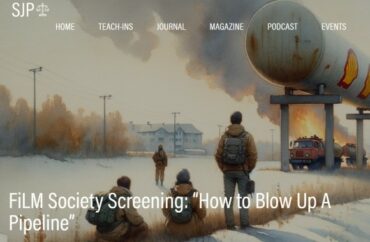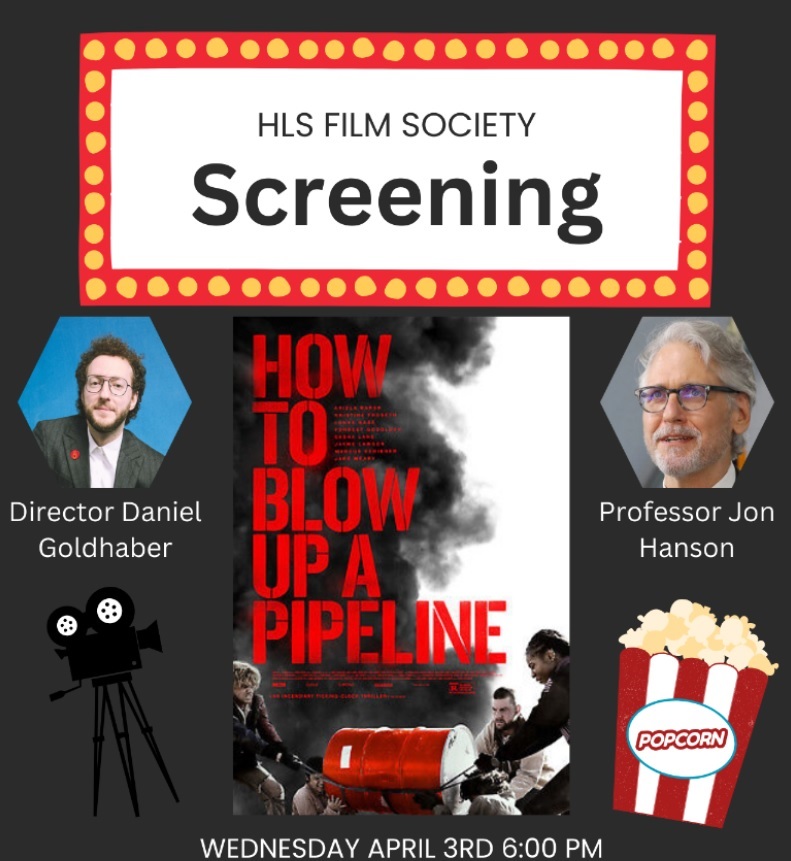
No response from film society, university asking if showing was canceled
Harvard Law School scrubbed its website of an event page advertising a screening of the film “How to Blow Up a Pipeline” amid concerns about endorsing violence.
Internet archives show the event page was removed sometime between Friday and Tuesday when The College Fix noticed it was gone. A post advertising the screening on Harvard’s Systemic Justice Project website also was removed prior to the event.
“How to Blow Up a Pipeline” is a fictional story about climate activists who blow up a section of pipe in Texas, according to the film’s website.
The trailer opens with a man building a homemade explosive and ends with police arriving at the site of a pipeline that has been blown up. The characters call the bombing “justified” and “an act of self-defense.”
It is unclear if the Wednesday evening screening was canceled, rescheduled, or still took place. The Fix contacted the HLS Film Society, communications office, and event moderator Professor Jon Hanson by email and phone Tuesday asking if the event had been canceled. None replied.
The Fix also reached out to the film society, Hanson, and the communications office March 28 with questions regarding the concerns about the film endorsing violence and university organizers’ stance on peaceful advocacy.
The film screening drew criticism online in recent weeks, including concerns that Harvard may be supporting violent activism. Critics include U.S. Rep. Mike Bost, an Illinois Republican, who said in a March 28 post on X that violent acts like those portrayed in the film are the reason he supports harsher penalties for eco-terrorism.
The fact that Harvard is planning to show ‘How To Blow Up A Pipeline’ is ridiculous. This film promotes eco-terrorism and is a risk to our national security. That’s why I introduced the Pipeline Sabotage and Accident Prevention Act to punish eco-terrorism. https://t.co/PW7oLtFRFi
— Rep. Mike Bost (@RepBost) March 28, 2024
Others pointed to the film website’s “Take Action” page, which displays a map of U.S. oil and gas pipelines and a message about legislation and anti-fossil fuel activism.
“Many of these bills transform misdemeanors like trespassing on, disrupting, or otherwise interfering with operations at critical infrastructure facilities into felony charges,” the page states. “If we want to survive we must protect the revolutionaries who take necessary actions to fight the fossil fuel industry and protect our existence.”
The message is followed by a list of links to anti-fossil fuel activist groups.
 Harvard’s screening announcement described the event for those interested in “environmental activism and/or excellent filmmaking.” It stated the film screening would be followed by a conversation moderated by Hanson with writer and director Daniel Goldhaber.
Harvard’s screening announcement described the event for those interested in “environmental activism and/or excellent filmmaking.” It stated the film screening would be followed by a conversation moderated by Hanson with writer and director Daniel Goldhaber.
The Fix contacted the film production and distribution company Neon Rated and filmmakers Goldhaber and Daniel Garber by email last week and again Wednesday with questions about why the website includes a map of U.S. pipelines and if the filmmakers are committed to only non-violent advocacy. None responded.
The film is based on a nonfiction 2021 book of the same name by Andreas Malm, a human ecology professor at Lund University in Sweden and climate activist.
The publisher’s synopsis describes the book as “an impassioned call for the climate movement to escalate its tactics in the face of ecological collapse.”
“We need, he argues, to force fossil fuel extraction to stop – with our actions, with our bodies, and by defusing and destroying its tools. We need, in short, to start blowing up some oil pipelines,” according to the synopsis.
It continues: “Offering a counter-history of how mass popular change has occurred, from the democratic revolutions overthrowing dictators to the movement against apartheid and for women’s suffrage, Malm argues that the strategic acceptance of property destruction and violence has been the only route for revolutionary change.”
Harvard University’s Department of Art, Film, and Visual Studies previously hosted a screening of the film in March 2023. The event announcement is still on the university website, and mentions a conversation with Goldhaber and Garber following the screening.
On Tuesday, Bard College in New York also hosted a screening of the film, according to an article by Young America’s Foundation.
MORE: AUDIO: Swedish professor advocates for violence against pipelines to stop climate change
IMAGE: Harvard Law School Systemic Justice Program, Harvard Law School Film Society





Please join the conversation about our stories on Facebook, Twitter, Instagram, Reddit, MeWe, Rumble, Gab, Minds and Gettr.